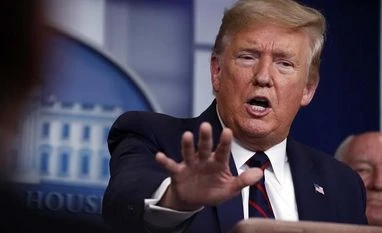The Trump campaign's interactions with Russian intelligence services during the 2016 presidential election posed a grave counterintelligence threat, a Senate panel concluded Tuesday as it detailed how associates of Donald Trump had regular contact with Russians and expected to benefit from the Kremlin's help.
The nearly 1,000-page report, the fifth and final one from the Republican-led Senate intelligence committee on the Russia investigation, details how Russia launched an aggressive effort to interfere in the election on Trump's behalf.
It says the Trump campaign chairman had regular contact with a Russian intelligence officer and says other Trump associates were eager to exploit the Kremlin's aid, particularly by maximising the impact of the disclosure of Democratic emails hacked by Russian intelligence officers.
The report is the culmination of a bipartisan probe that produced what the committee called the most comprehensive description to date of Russia's activities and the threat they posed.
The investigation spanned more than three years as the panel's leaders said they wanted to thoroughly document the unprecedented attack on U.S. elections.
The findings, including unflinching characterizations of furtive interactions between Trump associates and Russian operatives, echo to a large degree those of special counsel Robert Mueller's Russia investigation and appear to repudiate the Republican president's claims that the FBI had no basis to investigate whether his campaign was conspiring with Russia.
Trump, who has repeatedly called the Russia investigations a hoax," said Tuesday he didn't know anything about the report, or Russia or Ukraine.
More From This Section
All I know is that I have nothing to do with either one of them and that came out loud and clear in the report," Trump said.
While Mueller's was a criminal probe, the Senate investigation was a counterintelligence effort with the aim of ensuring that such interference wouldn't happen again.
The report issued several recommendations on that front, including that the FBI should do more to protect presidential campaigns from foreign interference.
The report was released as two other Senate committees, the Judiciary and Homeland Security panels, conduct their own reviews of the Russia probe with an eye toward uncovering what they say was FBI misconduct in the early days of the investigation.
A prosecutor appointed by Attorney General William Barr, who regards the Russia investigation with skepticism, disclosed his first criminal charge Friday against a former FBI lawyer who plans to plead guilty to altering a government email.
Among the more striking sections of the report is the committee's description of the professional relationship between former Trump campaign chairman Paul Manafort and Konstantin Kilimnik, whom the committee describes as a Russian intelligence officer.
Taken as a whole, Manafort's high-level access and willingness to share information with individuals closely affiliated with the Russian intelligence services, particularly Kilimnik, represented a grave counterintelligence threat, the report says.
The report notes how Manafort shared internal Trump campaign polling data with Kilimnik and says there is some evidence Kilimnik may have been connected to Russia's effort to hack and leak Democratic emails, though that information is redacted.
The report also says two pieces of information raise the possibility of Manafort's potential connection to those operations, but what follows is again blacked out.
Both men were charged in Mueller's investigation, but neither was accused of any tie to the hacking.
A Manafort lawyer, Kevin Downing, said Tuesday that information sealed at the request of Mueller's team completely refutes whatever the intelligence committee is trying to surmise.
He added, It just looks like complete conjecture. Like Mueller, the committee reviewed a meeting Trump's oldest son, Donald Trump Jr., took in June 2016 with a Russian lawyer he believed to have connections with the Russian government with the goal of receiving information harmful to his father's opponent, Democrat Hillary Clinton.
The Senate panel said it assessed that the lawyer, Natalia Veselnitskaya, has significant connections to the Russian government, including the Russian intelligence services, as did another participant in the meeting, Rinat Akhmetshin.
The panel said it uncovered connections that were far more extensive and concerning than what had been publicly known, particularly regarding Veselnitskaya.
In a statement, Akhmetshin said he was exonerated, yet again, of the false claim that I am a Russia spy."
The report also found no reliable evidence for Trump's longstanding supposition that Ukraine had interfered in the election, but did trace some of the earliest public messaging of that theory to Kilimnik and said it was spread by Russian-government proxies who sought to discredit investigations into Russian interference.
The committee said that messaging campaign lasted to at least January 2020 after the House had impeached Trump for pressuring Ukrainian officials to investigate the family of Democrat Joe Biden, now Trump's general election opponent.
During that effort, some Republicans, including Trump, argued Ukraine was meddling, not Russia. Trump was acquitted by the Senate.
The report purposely does not come to a final conclusion, as Mueller did and as the House intelligence committee's 2018 report did, about whether there is sufficient evidence that Trump's campaign coordinated with Russia to sway the election to him and away from Clinton, leaving its findings open to partisan interpretation.
)